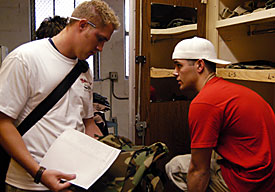 |
|
DANIELLE MALOTT/Arizona Daily Wildcat
|
Cadet Juan-Carlos Mazry, criminal justice and business freshman, hands a uniform to Cadet Dan Harris, an accounting senior, for this weekend's Army ROTC trip to Fort Huachuca.
|
|
By Shelley Shelton
Arizona Daily Wildcat
Friday March 28, 2003
While the conflict in Iraq deepens and more military units are deployed, UA ROTC members and peace activists alike agree that everyone should support the troops.
Despite rumors to the contrary, attacks on military students have been relatively few in number.
"We've had a few incidents of people being yelled at, verbal attacks, pretty much minor-league stuff," said U.S. Army Maj. Stewart Slatton, department of military science enrollment adviser.
People might target those in uniform because they are symbolic representatives of the government that makes policies they disagree with, he said.
"Most people understand that those of us who have chosen to make the military a profession don't make policy," he added.
"We have a lot of positive support," said Army ROTC Cadet Major Aimee Hemery, a psychology senior.
However, Hemery said she was surprised by the magnitude of the peace protests.
"It's great to see how many people are aware of what's going on," she said.
Some student activists emphasized the need to remember that the troops are people, not just soldiers.
"We don't support the government," said anthropology senior Aaron Kappeler, who was participating in the 24-hour library peace protest. "We support our troops, as human beings, to come back to the United States and out of harm's way."
While campus peace activists subscribe to similar beliefs, they vary in the way they express themselves.
"Whether you agree with the war or not, we all need support ending the war and bringing our troops home safely," he said.
"I'm glad people are doing something, but I come at it from a different angle than they would," said Noah Haiduc-Dale, vice president of the Alliance for Peace and Justice in the Middle East.
"I feel sorry (because the ROTC students) are part of a system that is sending our young people to a questionable war," he said.
Haiduc-Dale, a Near-Eastern studies graduate student, said that no matter what, harassing military students is "the most ridiculous way for people to take out their anger against the government."
"It just makes things worse."
Hemery said that peace protests are necessary, adding, "people need to express their opinions."
Because she has not yet graduated from the ROTC program, Hemery cannot be deployed.
"Cadets are first and foremost students," she said.
Yet, there are several non-ROTC military students on campus who could be sent overseas, such as reserve members.
If they are called to duty, they will receive a 100 percent refund for the semester after they file their withdrawal paperwork and bring in a copy of their orders, said Jael Walker, administrative associate in the Office of the Dean of Students.
Such students would receive either a passing or failing mark in each of their classes, she said, and the dean's office could also notify professors of their deployment.
However, the dean's office has no way of tracking how many students have withdrawn for military service, Walker said.

